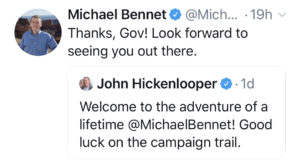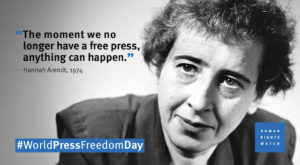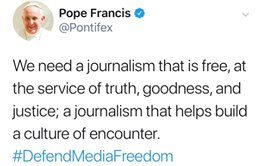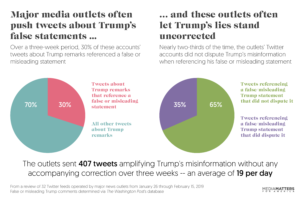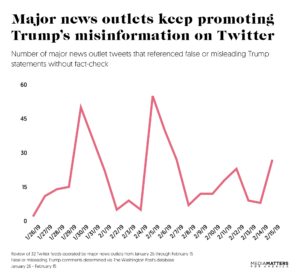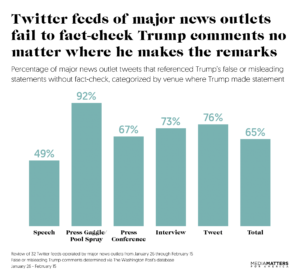#21
May 3, 2019At first a little disheartened to learn yet another candidate joined the Democratic presidential race.
“Now who’s running?”
“Who?”
“Colorado?”
It’s a lot to follow, isn’t it. But here’s the thing. It’s early. And the first Democratic debate is next month…yep. June. Following the rules the DNC has set for the candidates to be on that stage, let’s help get them there with 65,000 unique donations ($1 to $5), and get them to poll at least 1%. These debates will help us define the platform. And all candidates need to pledge to focus on the issues, and not disparage or debase each other. Indivisible https://indivisible.org is asking candidates and voters to take the pledge, #2020, to join us make the primary constructive, rally behind the winner, and do the work to beat DT. ✔Done.
And read their platforms.
Here’s Bennet’s. Impressive. Hopeful.
Rising to the Challenge
Building Opportunity in America & Restoring Integrity to Our Government
“Expectations. Americans built our nation on the high expectation that, as a people, we could govern ourselves better than any tyrant. These aspirations to self-government take many forms. They include our elections, three co-equal branches of government, and shared rights and obligations as citizens. They include our commitment to pluralism, democracy, and the rule of law. And they include our most cherished beliefs: that we are created equal, that our rights to life, liberty, and the pursuit of happiness are inalienable, and that we have a collective obligation to seek a more perfect Union.
We have never fully realized these aspirations, and more than once we have betrayed them. But over nearly two and a half centuries, even as we had tremendous disagreements, we struggled to make our country more democratic, fair, and free. The point has never been that we would all agree. Living in a free society means living with disagreement and people who disagree with me or with you. The challenge for us today, as it always has been, is to contend with those disagreements, even burnish them, in ways that will create imaginative and durable results to brighten the future for our children and our country.”
More:
https://medium.com/@michaelbennet/why-im-running-ba87375a427f
Michael Bennet
Bennet is the son of Mayflower descendants on his father’s side and Holocaust survivors on his mother’s.
“Sound, stable government can’t be a perpetual game of shirts and skins.Electoral victory is not an end in itself. It is intended to set in motion a pluralist process to resolve our disputes and move the country forward.Finding our way will not be easy in the context of a national government awash in special-interest money and with elected officials who quake at the first sign of a social media storm.Demagoguery is not unknown in American history. Anytime Americans have become fearful or worried, there have been those, like our current president, who saw personal advantage in fanning those flames. But their names are not inscribed on the honor roll of history. Sowing division does not require moral authority.What we must decide in this election — now having seen what is down the easy path of our worst instincts and pessimism in our country and each other — is whether that is the road we will continue to choose.”
FiveThirtyEight
How Michael Bennet Could Win The 2020 Democratic Primary
https://fivethirtyeight.com/features/how-michael-bennet-could-win-the-2020-democratic-primary/amp/
“What else does Bennet have going for him? Well, he’s got a winning track record in a purple state, and he’s a moderate, both points he could use to sell himself as a good bet in the general election. Bennet was more conservative than 82 percent of Senate Democrats in the previous Congress, according to his DW-Nomination, which measures politicians on a scale from -1 (most liberal) to 1 (most conservative) based on their congressional voting record. His career -0.208 score puts him relatively close to fellow presidential candidates like Sen. Amy Klobuchar (-.252) and former Rep. Beto O’Rourke (-0.304), which could make Bennet’s path a bit harder, and former Vice President Joe Biden’s entry into the race has sucked up a lot of the oxygen for candidates ruining near the middle. But should Biden struggle, it’s entirely possible that the field could open up for someone like Bennet. Bennet might also benefit from arguments within the Democratic Party about “electability” and identity given that white men often seem to get preference in those discussions. And his recent bout with prostate cancer gives him with a personal story to share with voters that can also double as a talking point about health care, a top issue for Democrats.
It won’t be easy for Bennet, of course. Besides being relatively unknown — a Monmouth University poll in March found that nearly half (48 percent) of Democrats had never heard of him and only 20 percent were able to form any opinion of him — Bennet will also have to contend with not even being the only Coloradan in the race. Former Gov. John Hickenlooper is running, too, which might limit Bennet’s ability to get endorsements or raise money in his home state, and that will make it much harder to get his campaign off the ground.
It’ll also be imperative that Bennet qualifies for the upcoming Democratic primary debates, which he could do by getting at least 1 percent support in three polls (he already has one) or by getting donations from at least 65,000 unique donors, which might be hard to accomplish before the first debates at the end of June.
It’s entirely possible that Bennet’s bid is more of a play for the vice presidency, or simply an attempt to bring more attention to issues that are important to him, such as government dysfunction and money in politics. But as his first run for the Senate shows, Bennet shouldn’t be underestimated.”
Rolling Stone
‘Bennet released a campaign video titled “7,591 words,” after the number of words in the Constitution. “The word ‘politics’ is not among them,” Bennet notes, before preaching the need to invest not in tax cuts for the wealthy and wars in the Middle East, but in social security, the VA, teacher pay, climate change and more. He also makes a point to say that he is not in favor of Medicare-for-All or free college, two progressive policy proposals that have gained traction among some of the Democratic frontrunners. “I’m not going to say there’s a simple solution to a problem if I don’t believe there is one.”’
‘Bennet’s announcement comes weeks after he underwent successful prostate cancer surgery. He noted last month that the initial diagnosis delayed his announcement. “The idea was to announce sometime in April,” he told the Colorado Independent. “That was the plan. We hired some staff. We interviewed people for positions in New Hampshire and Iowa. And then I went for the physical. In my last physical, my PSA was high. They did a biopsy, and it was clear. But this time, it was not clear.”
He’s said that he was first inclined to run while writing a book about partisanship in Washington. He referenced the book and its message Thursday on CBS This Morning. “I’ve spent the last couple of years writing a book about our politics over the last 10 years or so,” he said. “I became convinced in that process that … if we keep going down this road, we’re going to be the first generation of Americans to leave less opportunity, not more, to the next generation,” he added. “I need to do everything I can do to make sure we don’t do that.”
He’s said that he was first inclined to run while writing a book about partisanship in Washington. He referenced the book and its message Thursday on CBS This Morning. “I’ve spent the last couple of years writing a book about our politics over the last 10 years or so,” he said. “I became convinced in that process that … if we keep going down this road, we’re going to be the first generation of Americans to leave less opportunity, not more, to the next generation,” he added. “I need to do everything I can do to make sure we don’t do that.”’
https://secure.actblue.com/donate/michaelbennetforamerica?refcode=g-b-a3&amount=10
#WorldPressFreedomDay ~ Media Matters
#WorldPressFreedom
#DefendMediaFreedom
“No democracy is complete without access to transparent and reliable information. It is the cornerstone for building fair and impartial institutions, holding leaders accountable and speaking truth to power.” — António Guterres, UN Secretary General
World Press Freedom Day was proclaimed by the UN General Assembly in December 1993, following the recommendation of UNESCO’s General Conference. Since then, 3 May, the anniversary of the Declaration of Windhoek is celebrated worldwide as World Press Freedom Day.
It is an opportunity to:
- celebrate the fundamental principles of press freedom;
- assess the state of press freedom throughout the world;
- defend the media from attacks on their independence;
- and pay tribute to journalists who have lost their lives in the line of duty.
https://www.un.org/en/events/pressfreedomday/
New @mmfa study: Major media outlets fail to debunk DT’s false or misleading statements in their tweets 65% of the time, amplifying his misinformation an average of 19 times per day.
“Why does this matter? Studies show 60% of Americans don’t read past the headlines, and the same proportion share tweets without clicking through. Media practices should reflect the way people consume news.”
Study: Major media outlets’ Twitter accounts amplify false DT claims on average 19 times a day
MATT GERTZ & ROB SAVILLO
Key Takeaways:
- 30% of the tweets by major media outlets’ Twitter accounts about DT remarks referenced a false or misleading statement.
- Nearly two-thirds of the time, the outlets did not dispute that misinformation.
- That means the outlets amplified false or misleading DT claims without disputing them 407 times over the three weeks of the study, an average of 19 times a day.
- The extent to which outlets’ Twitter feeds passively spread DT’s misinformation depended on the platform in which DT made his comments. For example:
- 92% of false or misleading DT claims went undisputed when he was speaking at a press gaggle or pool spray.
- 49% of false or misleading DT claims went undisputed when outlets were responding to comments he made during formal speeches.
- @TheHill was the worst actor and sent more than 40% of the tweets that pushed DT’s misinformation without disputing it during our entire study.
Major media outlets failed to rebut DT’s misinformation 65% of the time in their tweets about his false or misleading comments, according to a Media Matters review. That means the outlets amplified DT’s misinformation more than 400 times over the three-week period of the study — a rate of 19 per day.
The data shows that news outlets are still failing to grapple with a major problem that media critics highlighted during the Trump transition: When journalists apply their traditional method of crafting headlines, tweets, and other social media posts to DT, they end up passively spreading misinformation by uncritically repeating his falsehoods.
The way people consume information in the digital age makes the accuracy of a news outlet’s headlines and social media posts more important than ever, because research shows they are the only thing a majority of people actually read. But journalists are trained to treat a politician’s statements as intrinsically newsworthy, often quoting them without context in tweets and headlines and addressing whether the statement was accurate only in the body of the piece, if at all. When the politician’s statements are false, journalists who quote them in headlines and on social media without context end up amplifying the falsehoods.
Anecdotally, it’s been clear for some time that journalists have not adjusted their practices for the DT era in which, according to The Washington Post, DT has already made more than 10,000 false or misleading claims. In recent months, Media Matters has explored how news outlets have passively misinformed the public by passing along misinformation from DT administration figures on topics like threats of violence against journalists, special counsel Robert Mueller’s report, potential conflict with North Korea, Special Olympics funding, and whether the Obama administration was “spying” on Trump associates.
The news outlets that spread the most passive misinformation:
- The Hill
- ABC News
- CBS News
Other media Twitter feeds we reviewed that sent 10 or more tweets passing on false or misleading DT comments include MSNBC’s main feed (2.41 million followers, 11 such tweets, failing to dispute 55% of the time); NBC News’ main feed (6.52 million followers, 13 such tweets, failing to dispute 52% of the time); Politico(3.8 million followers, 14 such tweets, failing to dispute 58% of the time); and Roll Call (359,000 followers, 10 such tweets, failing to dispute 83% of the time).
Notable exceptions:
Some feeds entirely avoided passing on DT’s misinformation over the course of the study. NPR’s main feed, which tweeted only 20 times about Trump quotes, debunked the misinformation in all four false claims it tweeted about.
Other Twitter feeds limited the exposure their audience had to DT’s misinformation by minimizing their focus on DT’s comments. For example, the feed for Meet The Press, the NBC News Sunday political talk show, failed to dispute DT’s falsehoods 83% of the time. But it rarely tweeted about DT comments, with such tweets making up only 9% of the outlet’s total tweets about DT. CNN’s main Twitter feed similarly referenced DT quotes in only 11% of the tweets about him, while doing somewhat better at fact-checking Trump, disputing his false claims 75% of the time.
The Washington Post’s feed disputed DT’s misinformation at the highest rate of any feed we studied that tweeted about 10 or more false Trump claims. Out of 37 tweets about false or misleading TDT claims, the outlet disputed the misinformation 33 times and failed four times, a success rate of 89%.
Your newsroom might be small. You should still think big.
You’re not too small. Don’t think like it: The Herald got help from the Seattle Times to create a thoughtful commenting template, partnered with several community radio stations to publish the audio part of the project and created a resource site for the community that takes minimal maintenance.


